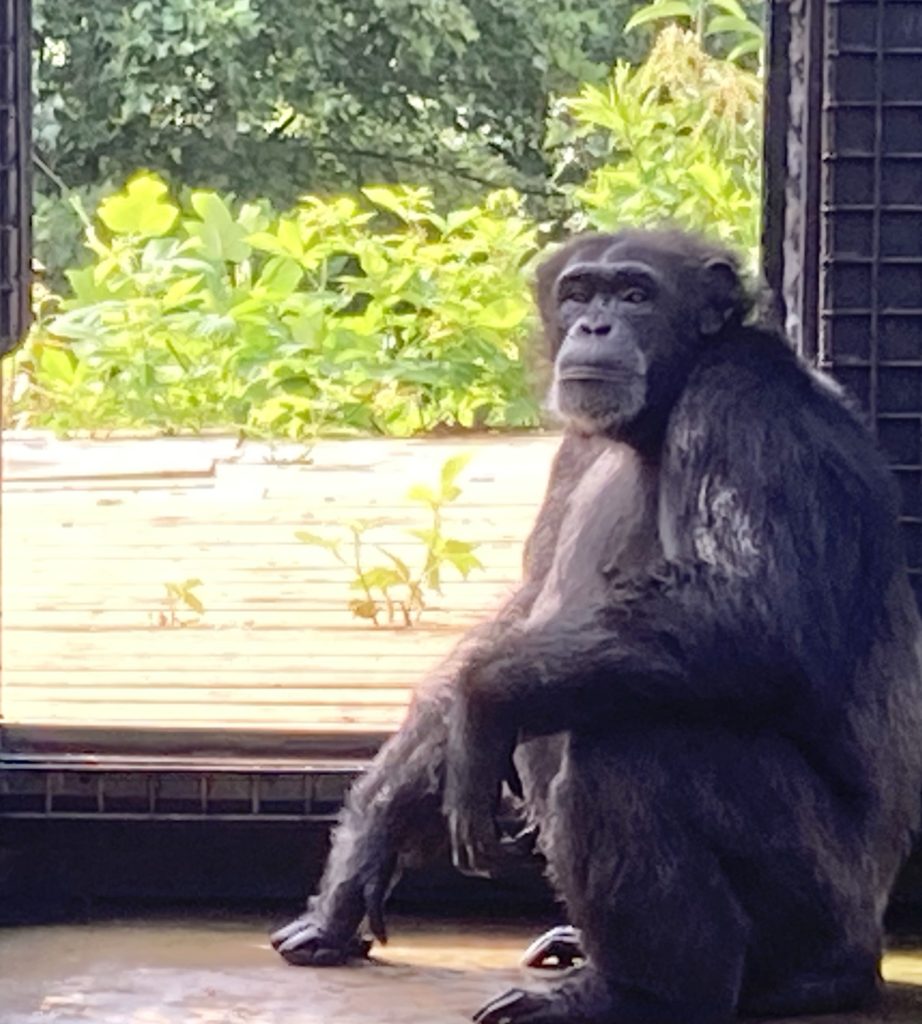
The BCS – Weight Management for Captive Chimpanzee Populations

By Kayla Adgate
How would you know if a chimp is obese? Or too skinny?
Physical fitness isn’t just a human problem. Captive chimps are especially prone to weight issues and conditions associated with body weight issues such as diabetes and heart disease. One pivotal role of caretakers at Project Chimps is to ensure resident chimps maintain healthy body weights. The Body Condition Scoring (BCS) System is one great tool that caretakers use to assess a chimp’s overall well-being.
The BCS: A More Accurate, “Hands-off” Approach to Quality Care
According to Tawnya Williams, one of the Chimpanzee Care Supervisors at Project Chimps, a chimpanzee’s body condition is an important indicator of overall physical health. One non-invasive, visual way to help gauge body condition is by using the Body Condition Scoring System, or the BCS, published by the American Journal of Primatology in 2020.
Amazingly, the Body Condition Scoring System, pictured below, may be more sensitive than traditional, more invasive methods of “identifying and quantifying obesity in chimpanzees” (Reamer et al., 2020, p.1). In this 10-point scale, visual images of varying degrees of body composition are displayed. Categories range from underweight, to normal weight, to overweight. Caretakers utilize the defining features in each category to visually assess a chimp’s body condition.
Basically, is the chimp emaciated, obese, or fit?

The BCS in the Field
Tawnya tells us that a lot goes into making sure that the BCS is used effectively in the field.
The care team utilizes the BCS in two different ways. First, the BCS is utilized by the veterinary staff during each chimp’s physical exam. This more hands-on examination must be performed when a chimp is sedated.
On a more regular basis, caretakers visually assess each chimp’s body condition and log these scores into the Animal Care Software. Two different caretakers must perform these visual inspections separately to help eliminate bias. The scores are combined for the average at each assessment.
“No Such Thing as Spot Reducing”
Just like in humans, the solution to chimp weight loss seems to lie in plain old diet and exercise. That’s right, even chimps need to workout.
Caretakers must be especially careful in helping captive chimp populations to manage their weight because cultivated fruit, a primary food source for chimps, contains more sugar than fruit naturally occurring in the wild. Captive chimps are especially prone to weight issues and conditions associated with body weight issues such as diabetes and heart disease. If you think teaching a human to handle their daily diabetic tests is hard, try teaching a chimp – avoidance is best.
There are a few chimps, in particular, that caretakers are watching closely at the moment: Babs, Kassie, and Rosie are on the heavier side. Caretakers are actively working on increasing their exercise and reducing their calorie intake.
But how do you “ask” a chimp to exercise?
Creativity is essential. Care staff often utilize a method called operant conditioning or Positive Reinforcement training to encourage reluctant chimps to move their bodies.
During this strategy, caretakers encourage chimps to target touch a bowl on the outside of the mesh, or move around to entice chimps to follow them. Caretakers also get chimps to move around by utilizing a laser pointer within the chimp’s rooms and by rewarding the chimps with a low-calorie, high-value food item. It’s just a matter of figuring out what works.
If there’s anything to learn from home-bodies like Rosie and Kassie, it’s don’t give up on fitness just yet. Creativity is key, and keep changing things up. Recently, Rosie and Kassie have both lost weight after meeting boys. Maybe it’s just a matter of finding the right approach, or motivation.
If you were a chimp, what would motivate you to eat right and workout? Got ideas? Share them with us!
Please consider donating to ensure we always have access to the tools and treatments we need for the chimps to keep them in tip top shape!

